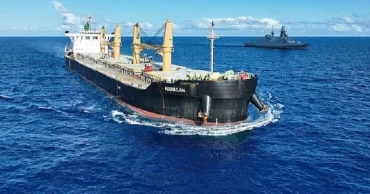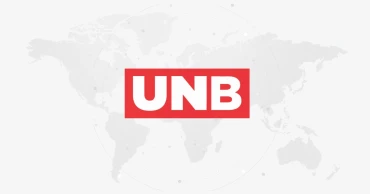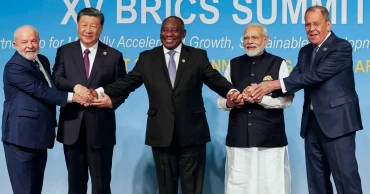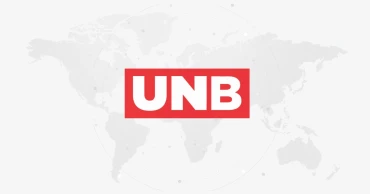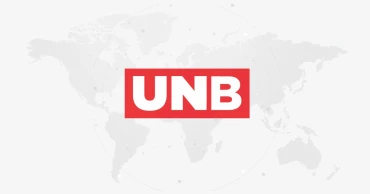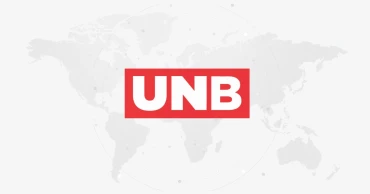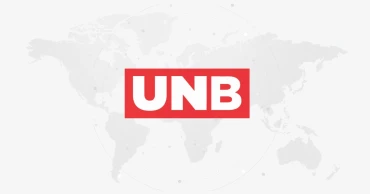United Arab Emirates
UAE opt to field in 2nd T20I vs Bangladesh
United Arab Emirates have won the toss and elected to field first in the second T20I against Bangladesh at the Sharjah Cricket Stadium on Monday.
Bangladesh, who lead the three-match series 1-0 following their 27-run win in the opening match, will look to seal the series today.
The visitors made a few changes to their playing XI, resting Parvez Hossain Emon — the centurion from the first match — and giving opportunities to other squad members.
UAE, meanwhile, aim to bounce back from their defeat and level the series.
Bangladesh eye series sweep against UAE in 2nd T20I
Bangladesh XI: Litton Das (capt), Tanzid Hasan Tamim, Najmul Hossain Shanto, Towhid Hridoy, Jaker Ali (wk), Shamim Hossain, Rishad Hossain, Tanzim Hasan Sakib, Shoriful Islam, Tanvir Islam, Nahid Rana
UAE XI: Muhammad Waseem (capt), Aryansh Sharma (wk), Alishan Sharafu, Rahul Chopra, Asif Khan, Dhruv Parashar, Muhammad Zohaib, Haider Ali, Muhammad Jawadullah, Matiullah Khan, Saghir Khan.
9 months ago
UAE adds third T20I vs Bangladesh to series
The United Arab Emirates will now host Bangladesh in an additional T20I match on Wednesday, May 21, at the Sharjah Cricket Stadium, the Emirates Cricket Board confirmed on Monday.
The third T20I has been added following discussions between the Emirates Cricket Board and the Bangladesh Cricket Board (BCB).
It will begin at 7:00pm local time, just like the second match of the series scheduled for today (Monday), also at Sharjah.
Originally, the two teams were set to play a two-match series, but the addition of a third match offers both sides more game time ahead of their future international commitments.
Bangladesh won the opening match of the series by 27 runs on Friday, thanks to a stunning century by Parvez Hossain Emon.
Broadcast of the series will be available globally, including T-Sports in Bangladesh, Fancode in India, Cricbuzz across MENA, Geo Super in Pakistan, Willow TV in the US and Canada, and Sportseye/YouTube.
9 months ago
UAE reaffirms commitment to working with Bangladesh
Ambassador of the United Arab Emirates (UAE) to Bangladesh Abdulla Ali ALHmoudi has said his country is keen to share its experiences with Bangladesh in the areas of civil aviation, ports and logistics, and defense partnership.
Moreover, he said, the UAE remains focused on direct investment for strengthening mutual economic and business partnership.
“I would like to take this opportunity to extend my best wishes to the current interim government in all their efforts. I also reaffirm our unwavering commitment to working together for a better and more prosperous Bangladesh,” said UAE Ambassador on Monday.
Chief Adviser Yunus hopeful SAARC can give dividends to people of the region if revitalised
Earlier, the UAE Embassy in Dhaka celebrated the 53rd Union Day amid festivities and enthusiasm. Civil Aviation and Tourism Adviser AF Hassan Ariff attended the reception as the chief guest.
Advisers, Ambassadors, heads of diplomatic missions, senior government officials, business persons, and representatives from the media, academic and social institutions also attended the ceremony.
Ambassador Ali AlHmoudi said the UAE and Bangladesh enjoy deep-rooted historical relations and this year is unique and remarkable as both are celebrating the Golden Jubilee- 50 years of diplomatic relations. “We are looking forward to strategic partnership between the brotherly countries,” he added.
The UAE Ambassador said it is a matter of pride that 1.2 million Bangladeshis are residing in the UAE, making significant contributions to both the UAE and Bangladesh.
Bangladeshi brothers and sisters in the UAE are now sending the highest remittance for Bangladesh, he said.
1 year ago
MV Abdullah leaving UAE for Bangladesh today
The Bangladeshi-flagged vessel MV Abdullah, recently liberated from Somali pirates, is scheduled to depart Al-Hamriya Port in the United Arab Emirates for Bangladesh today (April 28, 2024) at noon, officials confirmed.
The vessel, which had been hijacked for 33 days, successfully unloaded 55,000 metric tonnes of coal at Al-Hamriya Port yesterday. The owner, KSRM Group, announced that the vessel and its crew of 23 sailors are expected to arrive at Chattogram Port by mid-May.
Mizanul Islam, a spokesperson for the Chattogram-based KSRM Group, reported that the loading operations were completed yesterday, and the vessel is now ready to embark on its journey back to Bangladesh.
MV Abdullah reaches Dubai’s Al Hamriya Port
MV Abdullah initially anchored at the UAE port on the evening of April 22, following its release from pirate captivity. Distinguished guests including Mohammad Abu Jafar, the Bangladesh Ambassador, and officials from SR Shipping, the vessel's operating company, were present to welcome the crew upon their arrival.
The ship first arrived at the outer anchorage of the port on April 21, following its ordeal which began on March 12 when it was seized by Somali pirates about 600 nautical miles off the Somali coast en route from Mozambique to Dubai.
The pirates took control of the vessel and its crew, holding them until a ransom of Tk 55 crore facilitated their release on the night of April 13.
Family counting days for safe return of MV Abdullah's chief engineer
Following the release, MV Abdullah headed to Al-Hamriya Port under the escort of an EU NAVFOR warship, navigating through approximately 480 nautical miles of high-risk areas along the Somali coast and the Red Sea before reaching the safety of the United Arab Emirates.
This voyage marks a significant step towards recovery after the harrowing pirate attack, with the crew looking forward to a safe return to their homeland.
Previous experience used to rescue MV Abdullah, crew: KSRM
1 year ago
Bangladesh to import 1.5mn metric tons of crude oil from Saudi Aramco, UAE’s Adnoc
Bangladesh will import 1.5 million (15 lakh) metric ton of crude oil from Saudi Arabia and United Arab Emirates (UAE) for the year 2024.
The Cabinet Committee on Economic Affairs (CCEA) in a virtual meeting, with Finance Minister AHM Mostafa Kamal, in-principle approved a proposal in this regard.
As per proposal of the state-owned Bangladesh Petroleum Corporation (BPC), moved by the Energy and Mineral Resources Division of the Ministry of Power, Energy and Mineral Resources, the crude oil will be imported through direct purchase method (DPM) which means there was no tender or competitive bidding process in selecting the supplier.
Dhaka urges Riyadh to consider crude or refined oil on deferred payment basis
The proposal mentioned that Saudi Aramco and UAE-based Adnoc will supply the total crude petroleum.
While briefing reporters about the outcomes of the Cabinet body's meeting, additional secretary of the Cabinet Division Sayeed Mahbub Khan informed that the cost or price of petroleum was not mentioned in the proposal as it came for in-principal approval.
Bangladesh needs to import about 6.5 million metric ton of petroleum oil annually. Of this, about 1.5 million is crude and the remaining amount is refined petroleum.
Glitch in brand new pipeline halts transfer of crude oil from mother vessel in Maheshkhali
The Cabinet body approved, in-principle, another proposal -- of Bangladesh Hi-Tech Park Authority under the Department of Information and Communication Technology -- to appoint a private company for operation and maintenance work of its “Vision 2041 Smart Tower” in Kawranbazar, Dhaka. The company will operate the building under the "Digital Entrepreneurship and Innovation Eco-System" project after its construction work.
2 years ago
Iran, Saudi Arabia and Egypt are among 6 nations set to join the BRICS economic bloc
Iran and Saudi Arabia are among six nations invited Thursday (August 24, 2023) to join the BRICS bloc of developing economies.
United Arab Emirates, Argentina, Egypt and Ethiopia are also set to join the bloc from 2024.
The announcement was made at the BRICS summit in Johannesburg by South African President Cyril Ramaphosa, whose country is the current BRICS chair.
Also read: China to support Bangladesh in joining BRICS: XI tells Hasina during talks
BRICS is currently made up of the emerging economies of Brazil, Russia, India, China and South Africa. Those five members agreed at this week's summit to expand the bloc.
It's the second time that BRICS has decided to expand. The bloc was formed in 2009 by Brazil, Russia, India and China. South Africa was added in 2010. The BRICS bloc represents around 40% of the world's population and contributes more than a quarter of global GDP.
Three of the group's other leaders are attending the summit and were present alongside Ramaphosa for the announcement, including Brazilian President Luiz Inácio Lula da Silva, Indian Prime Minister Narendra Modi and Chinese President Xi Jinping.
Also read: BRICS: China, Russia and other emerging economies turn to main summit agenda in South Africa
Russian President Vladimir Putin did not travel to the summit after the International Criminal Court issued an arrest warrant for him in March for the abduction of children from Ukraine. He has participated in the summit virtually, while Russia was represented at the announcement in Johannesburg by Foreign Minister Sergey Lavrov.
2 years ago
Ad agency uses foreign footage in Philippines tourism video, later apologises
An advertising agency in the Philippines has apologised for using visuals of tourist attractions in other countries in a promotional film.
Visuals from the ad included rice terraces in Indonesia, sand dunes in the United Arab Emirates, and a plane landing in Switzerland, reports BBC.
The ad agency, DDB Philippines, apologised for the "unfortunate oversight," it said.
Also read: Bangladesh’s first tourism master plan yet to be formulated, was supposed to be completed last Dec
Christina Garcia Frasco, Philippines' tourism secretary, stated that public money was not utilised for the film.
According to Frasco, the Department of Tourism frequently sought confirmation from the agency that the elements used in the ad were their own and unique, said the report.
"ALL these occasions, DDB repeatedly assured the DOT that the originality and ownership of all materials are in order," she said.
Also read: Master plan for tourism in Bangladesh to be formulated in Dec: State Minister
It was created as part of the "Love the Philippines" campaign, which was launched in late June at a cost of $900,000, the BBC report added.
Analysis by French news agency AFP and Philippine blogger Sass Rogando Sasot first revealed the use of visuals from other nations in the ad.
Frasco stated that the department will ensure DDB Philippines accepts responsibility for the video.
Also read: “We very much value and welcome tourists from Bangladesh”
In its own response, DDB Philippines stated that the usage of stock material in mood films is common in the advertising industry, but it apologised for using other videos in this case, the report also said.
“The use of foreign stock footage in a campaign promoting the Philippines is highly inappropriate, and contradictory to the DOT's objectives,” it said.
The video has been withdrawn, and the company has stated that it would cooperate with the Philippines tourism department's inquiry.
Read more: These are the top 25 hotels in Asia, according to Tripadvisor
2 years ago
UAE to support Bangladesh in building infrastructure and sea port: Envoy tells PM
The United Arab Emirates will continue its cooperation with Bangladesh in the development of its infrastructure and sea ports for mutual benefits.
The UAE's newly appointed ambassador to Bangladesh Abdulla Ali AlHmoudi said this during a courtesy call on Prime Minister Sheikh Hasina at Ganabhaban on Wednesday (May 17, 2023).
Prime Minister’s Press Secretary Ihsanul Karim briefed reporters after the meeting.
The UAE envoy said that his county will carry forward the friendship and cooperation with Bangladesh for economic development.
Also Read: Economic cooperation needed among countries in South and Southeast Asia: PM tells outgoing Korean envoy
Ali AlHmoudi apprised the prime minister about his meeting with Bangladesh's state minister of civil aviation and tourism regarding the cooperation in the aviation sector.
The ambassador recalled that the foundation of the bilateral relation between Bangladesh and the UAE was laid by fathers of the two nations Bangabandhu Sheikh Mujibur Rahman and Sheikh Zayed bin Sultan Al Nahyan through a visit to the Gulf nation by Bangabandhu in 1974.
Later, Sheikh Nahyan also visited Dhaka in 1984 and played a very pivotal role in establishing solid foundation of the bilateral ties between the two brotherly countries, he added.
Also Read: PM Hasina: Bangladesh won't buy anything from those who impose sanctions against it
During the meeting, the prime minister highly appreciated the UAE leadership as they are going to host the COP-28 summit meeting in November next in Dubai.
About Bangladeshi expatriates working in the UAE and Middle Eastern countries, she put emphasis on learning Arabic language by those seeking to go there for jobs.
The PM welcomed the new UAE envoy in Dhaka and assured him of providing all cooperation during his stay in Bangladesh.
Hasina also conveyed her best wishes to the UAE leadership through the ambassador.
Read More: Community clinics model: UN adopts resolution highlighting Sheikh Hasina initiative
Ambassador-at-Large Mohammad Ziauddin and Prime Minister’s Principal Secretary M Tofazzel Hossain Miah were present at the meeting.
2 years ago
MoU on ‘e-visa’ inked between Bangladesh-UAE
A Memorandum of Understanding (MoU) was signed between Bangladesh and the United Arab Emirates (UAE) in a bid to implement ‘e-Visa/e/-TA’ in the capital on Tuesday (October 18, 2022).
Security Services Division under Home Ministry Md Abdullah Al Masud Chowdhury and UAE Ambassador to Bangladesh Abdulla Ali Abdullah Khaseif Al Hamoudi singed the MoU on behalf of the respective countries with Home Minister Asaduzzaman Khan in the chair at a programme at the conference room of the ministry.
Minister Asaduzzaman said the initiative to implement ‘e-Visa/e/-TA’ system on the basis of ‘G2G’ was taken through the MoU sign.
Read: Bangladesh, UAE sign four MoUs on big projects
Terming the MoU as a big achievement in the bilateral relations of the countries, he said the day (MoU signing day) will be marked as a milestone for Bangladesh and the UAE in digitalisation of the country’s ‘e-visa’ system.
Describing UAE as a tested-friend, he said Bangladeshi workers have been playing an important role in the development of the both countries over the time.
The minister said the UAE is one of the main investment partners of Bangladesh and mutual respect and significant cooperation between the countries is the historic base of the bilateral relations.
Read UAE Golden Visa, Green Visa, Job Visa 2022: How to apply
He said the implementation of the ‘e-visa’ is one the significant pledges of Prime Minister Sheikh Hasina to digitalise the country as the current government has underscored on the use of digital technology.
Asaduzzaman said the security services division will be able to provide online visa service once the ‘e-visa’ system is implemented.
He hoped that number of foreign tourists and investment will be boosted to a great extent after the ‘e-visa’ is launched in the country.
Read Malaysia My Second Home (MM2H): Who's eligible for Malaysian Golden Visa or Investor Visa
The minister thanked the UAE government for their support to implement the ‘e-visa’ system.
3 years ago
United Arab Emirates detects first case of monkeypox
Health authorities in the United Arab Emirates detected on Tuesday the country’s first case of the monkeypox virus in a young woman who traveled from West Africa.
The government said little about the patient, but stressed that authorities were investigating her contacts and “taking all necessary measures” to limit the spread of monkeypox.
The statement did not say where the case had been discovered in the federation of seven sheikhdoms, which includes the capital of Abu Dhabi and tourist hub of Dubai.
Read: No Monkeypox cases detected in Bangladesh: BSMMU VC
Throughout the coronavirus pandemic, authorities in the autocratic country similarly had declined to offer a geographic breakdown for COVID-19 cases.
The diagnosis in the UAE marks the first reported case on the Arabian Peninsula. Israel recorded the first reported case in the Middle East earlier this week. The World Health Organization has identified over 100 cases globally.
Read: New Monkeypox Outbreak: What We Know So Far
Cases of the smallpox-related disease have previously been seen only among people with links to central and West Africa. But Britain, Spain, Portugal, Italy, the U.S., Sweden and Canada all reported infections, mostly in young men who hadn’t previously traveled to Africa. France, Germany, Belgium and Australia have also identified cases.
The virus originates in primates and other wild animals and causes fever, body aches, chills and fatigue in most patients. People with severe cases can develop a rash and lesions on the face, hands and other parts of the body.
3 years ago



